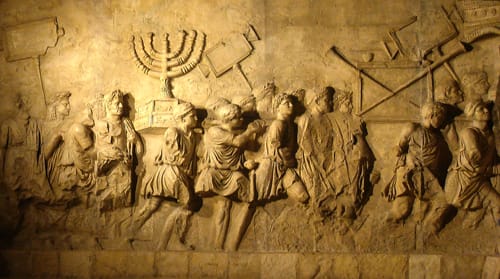Normally, the last meal eaten before the Tish’ b’Av fast is supposed to be a spare meal eaten in solitude, since the mourning of Tish’a b’Av begins already the day before. (In fact, the mourning customs begin already three weeks earlier, and then intensify beginning with the month of Av and then further with the week in which Tish’a b’Av falls.)
Ed. note: This last mentioned period does not exist this year.
However, when the eve of the fast is on Shabbat, we don’t limit our last meal at all. The Shulchan Arukh (OC 552:10), following the gemara (Taanit 29b), uses an interesting expression: “He may set the table even like the repast of Shlomo in the time of his kingship”.
The reference to King Shlomo is understandable; the book of Melakhim (I 5:2-3) describes the great opulence of Shlomo’s table. But what does the expression “in the time of his kingship” add?
Rashi refers us to a Talmudic passage relating that Shlomo was actually deposed from his rule for a period of time by the chief of the demons, Ashmedai. During this period, states the gemara, Shlomo was reduced to begging from door to door until the Sanhedrin learned of the situation and helped restored Shlomo to his throne. (Gittin 68b.)
However, this answer is still only partial. Certainly we wouldn’t think that the expression to eat “like the repast of Shlomo” would refer to the period when he was a poor beggar! What then is hinted by the oblique reference to this period?
One possible understanding is given by the commentary of the Maharal (Chidushei Aggadot on Gittin). The Maharal explains that the “deposition” of Shlomo actually refers to a drastic breakdown of his character. Shlomo’s character was reduced from the height of nobility and holiness to the depths of dissolution, until he was no nobler than a street urchin.
During this period, the material consumption of the royal household was not altered, but the nature of the consumption was. In place of regal luxury, the king’s enjoyments were reduced to bestial indulgence (as we see from the passage in Gittin). His appreciation of royal splendor was no greater than that of a depraved beggar.
This gives us two complementary ways of understanding the legitimacy of eating “even like the repast of Shlomo at the time of his kingship”.
1. We could possibly think that we are indeed permitted to eat a sumptuous meal on Shabbat afternoon, in order to avoid public conduct of mourning at this time. But according to many opinions we still have to conduct a degree of private mourning, just as an ordinary mourner on Shabbat observes those restrictions that are private. (See Rema end of OC 553.) We could think that we may eat a large meal, but without the ordinary regal bearing worthy of the Shabbat queen and the accompanying extra soul. Inside, we already begin to feel the sting and degradation of the destruction of the Temple. Thus the gemara tells us that we may eat even like the repast of Shlomo at the time of his kingship – at the height of his character and his ability to appreciate kingly opulence.
2. Perhaps on the contrary the gemara is telling us that we may indeed indulge ourselves on the eve of Tish’a b’Av since it falls on Shabbat, but we must be extra careful that our indulgence is of the elevated, regal character which suits the holy Sabbath day. If our meal is a mere sating of base appetites like that of Shlomo when he was “deposed” from kingship – that is, according to the Maharal, when he lost all his regal bearing and elevation – it would be better to eat in moderation in anticipation of the impending period of national mourning.
The enjoyment of Shabbat, when we remind ourselves that ultimately the world will be perfected and our main task will be to assimilate the Divine beneficence, does indeed supersede the mourning of Tish’a b’Av and the eve of Tish’a b’Av. But it is only worthy of doing so when this enjoyment is of the refined and elevated level which truly does bring us near to the apprehension of G^d’s kindness and of the world’s ultimate perfectibility.
Rabbi Asher Meir is the author of the book Meaning in Mitzvot, distributed by Feldheim. The book provides insights into the inner meaning of our daily practices, following the order of the 221 chapters of the Kitzur Shulchan Aruch.
The words of this author reflect his/her own opinions and do not necessarily represent the official position of the Orthodox Union.



